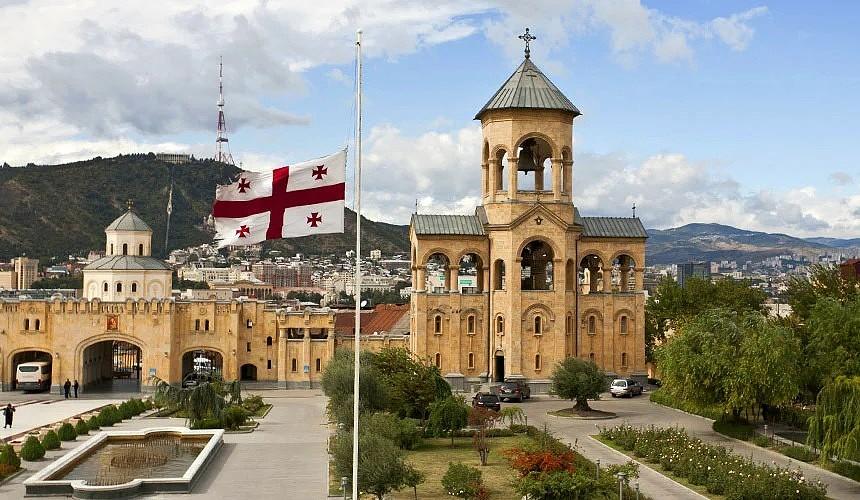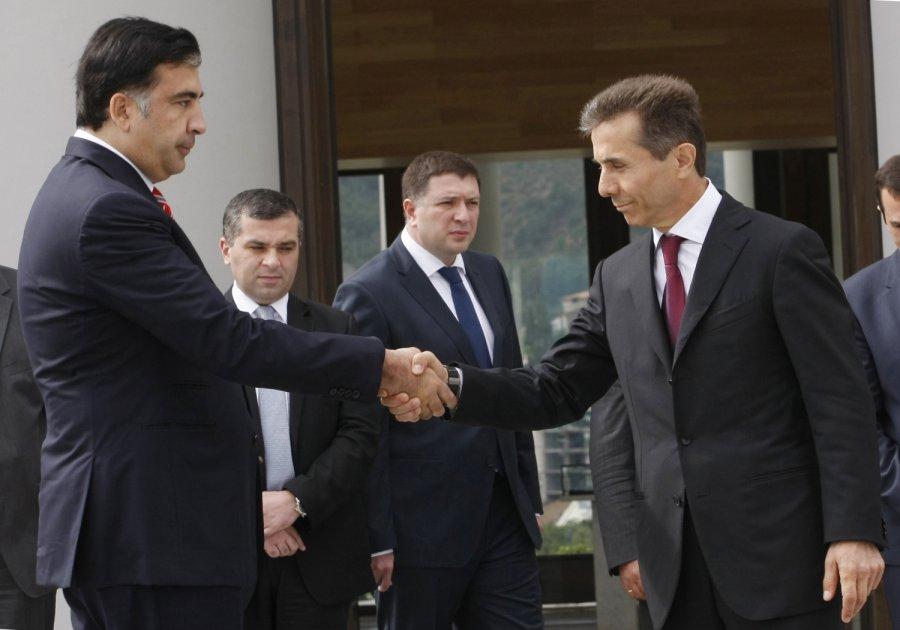Expert: Saakashvili and Ivanishvili only aggravate the split in Georgian society Caliber.Az from Tbilisi
Director of the Georgian Center for Strategic Communications, analyst, and international relations specialist Dimitry Moniava spoke with Caliber.Az about Georgia's hopes for the European Union and reliable neighbors – Azerbaijan and Türkiye.
- The European Union has recently decided to grant the candidate status for membership to Moldova and Ukraine, but Georgia was told that it needs to address certain issues for this. Why do you think Georgia was bypassed?
- First of all, because problems really do exist. Georgia started some reforms earlier than Ukraine and Moldova and was ahead of these countries in many international ratings, but then it seemed to stall. This was most clearly seen in relation to the reform of the judicial system. It became obvious that the ruling Georgian Dream wanted to keep control over the courts. Amendments to the Law on the Judiciary, advantageous to the ruling government, were repeatedly approved, and critics from our Western partners were met with harsh, even rude responses.
Moreover, the Georgian Dream withdrew from the compromise agreement mediated by European Council President Charles Michel. It was not ideal, but it reduced political tensions and pushed the parties to work together on the reforms necessary for European integration. Thus, the responsibility for the negative EU verdict lies primarily with the Georgian Dream, although a significant part of the opposition did not behave impeccably either. The opposition tried to play on the contradictions between the official Tbilisi and the EU, to blow them up and use them for their own purposes, instead of trying to bring the government back to the road map of reforms.
Cyclists have an "intermediate sprint" term. The final, full EU membership is the distant finish of the "Europe Tour", and candidate status is an intermediate sprint, after which the race will continue and become more intense. Georgia was in the lead for some time, but did not reach the intermediate finish line - either the wheel got crooked or the rider got tired. The Georgians are selfish, they are very hurt, but there is nothing fatal about what happened. On the contrary, there is a positive goal in Georgian politics - the implementation of concrete reforms by the end of the year, something more interesting than the endless, fruitless bickering of parties.
There were other factors, independent of the situation in Georgia, that worked not against it, but rather in favor of Ukraine and its closely related Moldova. French President Macron, for example, said that under normal circumstances Ukraine would not have been a candidate, but the EU's decision was influenced by the war. He also noted that, unlike Ukraine and Moldova, the South Caucasus states are in different geopolitical and geographical locations. The Georgian ruling party based its whole theory of geographical determinism on these statements, convincing the voters: "Nothing can be done, you see - geography, geopolitics." The importance of this factor should not be exaggerated, but it should not be discarded either.
Modern politicians have lost their "sense of geography", let us call it so conditionally. They can fly to Brussels in a few hours and receive an e-mail from there in a few seconds. If we remember memoirs of figures of the first Georgian republic, for example, diplomat Zurab Avalishvili, we will see how they travelled long and hard to decision-making centers in Europe - Paris, Berlin, London and felt that Georgia was really far from them and it is necessary to formulate some key idea that would help overcome the remoteness factor. The current Georgian politicians have no such inner concentration and geography for them is not a challenge to be overcome, but an excuse to justify their failure.

- And yet, can such a decision by the EU be considered political and related to the fact that Georgia has not opened a second front against Russia?
- No, the EU does not need a "second front," and it is not going to open one. Nobody made such statements or even hinted at it. There were a few ill-considered comments by Ukrainian figures, including the Secretary of the Ukrainian Security Council, Danilov, who expressed the sense that a "second front" in Georgia or Moldova would help Ukraine to hold out. But these people do not represent the EU. At the same time, the "second front" is another propaganda construction, an excuse that the ruling party uses to convince citizens that it is not to blame for the problems with European integration, that it is supposedly being punished for not letting Georgia get involved in the war. The other day, three Georgian Dream MPs formally withdrew from her ranks to develop this theme without causing diplomatic problems for it. Judging from the first statement, they are going to tell how the government was pressured by the West to open a "second front." They are going to do it for quite a long time, dosing the information, probably until the end of the year, when by the end of the "testing period" Georgia may not be granted the status of a candidate again. That is, they seem to have come up with a universal justification, which would cover any failure of the authorities.
Meanwhile, the "second front," if it were opened, would create huge risks for the South Caucasus transit and would put at risk not only the interests of Azerbaijan, Türkiye, and Georgia but also the interests of the European Union, with extremely doubtful strategic prospects. Simply put, a "second front" is a dangerous chimera.
- And if Saakashvili had been in power, could Georgia have counted on EU candidate status?
- I think not. First, during his rule, the rights of citizens, especially prisoners, were frequently and grossly violated, and the media was under serious pressure. Secondly, one of the key recommendations of the European Union is depolarization and reduction of political tension. The image of Saakashvili splits the society: in a March survey by the International Republican Institute (IRI), 31% of respondents expressed a positive attitude towards him, and 60% expressed a negative attitude.
Bidzina Ivanishvili has identical figures. In many cases, it is not just a dislike but a hatred. One can read Georgian media and social networks for a couple of hours to be convinced of that and feel the atmosphere of the "cold civil war". Neither Saakashvili nor Ivanishvili, judging from their behavior in the past, are fit for the role of a leader who will help the nation to overcome the rift, they aggravate it. Theoretically, some notional Vaclav Havel could help the Georgians by using his moral authority to bring the parties together and shift their attention from internecine strife to European integration and the reforms necessary for it. But as soon as such people get close to politics, all parties, for which polarization and hatred are their natural habitat, pounce on them and literally throw them out of political life with the dirtiest propaganda and other tools of pressure. Georgia's Havel would have been in a trouble.

- Do you think Georgia's EU aspirations will diminish after this insulting rejection?
- Probably not. Now, this is a matter of ego, almost a national idea - not yet overgrown with theories and programs, which is at the stage when political and psychological factors are mixed up. There is resentment, there is irritation, and there are also some rational calculations, however fragmentary. Politicians will actively exploit these feelings and thoughts in their own interests, but the price for this will be a limitation of maneuverability. Simply put, in the near future, they will have to prove to the voters who of them is the number one European. Unfortunately, this will happen first and foremost in the sphere of slogans, not real actions.
- And how will the EU decision affect Georgia's relations with the West?
- No major changes are likely to take place; the course and forms of interaction will generally remain the same. Foreign policy is not a ship whose course can be changed by a sharp turn of the steering wheel, but rather a train - it does not jump from one track to another. I heard this metaphor from the former Minister of Foreign Affairs Alexander Chikvaidze when he was asked to speak about foreign policy orientation. If the preconditions influencing the formation of foreign policy do not change, such as the transit function of the country or the ideas of European integration dominating in society, the relations are likely to change only stylistically. The tone of the dialogue will change, the degree of involvement of European structures in Georgian politics will probably increase, with their participation a new compromise agreement may even be concluded between the parties, but the essence of relations and the basis will not change.
- Why, in your opinion, has there been an increase in pro-Russian sentiment in Georgia lately, primarily in the expert community?
- I would not say that there has been an increase. Recently, all sociological surveys have recorded a worsening of attitudes towards Russia, more respondents view it as the number one threat than before the start of the war in Ukraine. Another thing is that citizens today are closely following frontline reports, their nerves are strained, and any pro-Russian statement causes a significant resonance - people react angrily, quote, and spread controversial quotations on social networks. The position of this or that expert may not be pro-Russian, but it may be perceived as pro-Russian, for example, if he ambiguously speaks about neutrality or some form of Finlandization. We have all seen how the recent statements of Henry Kissinger and Edward Luttwak were mostly negatively perceived in Georgia and Ukraine; passions run high around local experts as well.
And there is another aspect to the problem: pro-Russian forces have really stepped up because they perceive what is happening as a "last and decisive battle." That is, maybe they have become more visible rather than more numerous.
- Do you think Georgia should continue to move towards the West or is it time to look to the East as well, towards Azerbaijan and Türkiye?
- Georgia cannot and must not oppose one the other on the basis of the present situation, its history, and culture, which synthesizes the forms and meanings found in the East and in the West. One should not link the promotion to the West only with the status of a candidate for EU membership. And one should not identify relations with Azerbaijan and Türkiye only with a transit flow or with historical ties. It is necessary to reveal the potential in new projects oriented to the future, more technological and intellectual. It is necessary to have a permanent dialogue on regional security, to enter into new formats that will strengthen it. The problem with contemporary Georgian politics is that in trying to discern global trends it often overlooks regional opportunities. This is a kind of "regional myopia" with a characteristic distracted look beyond the horizon. Georgia is not a flying island from Jonathan Swift's book, which in the process of European integration will move westward and hover somewhere over the Bay of Biscay. Although many think that something similar is going to happen. We will still live and work side by side with Türkiye and Azerbaijan, and if any threat occurs, they will be the first to come to our aid. This is what we must proceed from.








